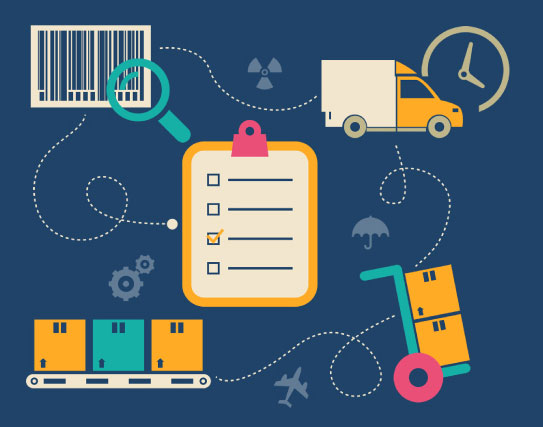Course Summary
Supply Chain Management is ever growing management concept, as it ensures the right balance between Customer Value and Financial Value of organisation. SCM helps to improve the Top line and Bottom line of the organisation and it helps individuals to improve their productivity with enhanced skills.This course will help you to understand SCM from end to end and use the concepts in your day to day operations in your organisation to improve productivity and effectiveness. In addition, updated learning of SCM will help to accelerate your career.
Contents
Organization vision, Missions, Goals
Alignment of Organization Goals
Customer Focus approach
Definition of Supply Chain
Evolution of Supply Chain
Operating Environments
Enterprise Resource Planning
Theory of Constraints
Lean Manufacturing
Financial Fundamentals
Components of Demand
Factors influencing Demand
Prioritization and Managing Demand
Forecasting Methods
Product Life Cycle
Planning Processes (S&OP, MPS, MRP)
Capacity Management
Execution and Control
Key Performance Indicators
Inventory Management
Procurement
Supplier Performance monitoring
Difference between Logistics and Supply Chain Management
Warehouse Management
Transportation Management
Physical Distribution
Global Trading
New concepts in SCM
Modern technologies
Course Direction:
For each topic, clear introduction followed with detailed discussion, interaction with users and sharing the knowledge among participants
Course will be completed with Multiple Choice Question and answers will be discussed with elaborated explanation to ensure the understanding of the course
by participants.
Course Audience:
Planning Executives and Managers
Procurement Executives and Managers
Supply Chain consultants
SCM IT consultants
Young professionals / graduates willing to enhance skills to fit to business

Course Summary:
Inventory is both an investment and a cost to your company and should be planned and controlled effectively to meet both your customer's satisfaction and your organization's profitability.
This course will help you to analyse your inventory in detail and in turn, use the right decisions to optimize your inventory.

Course Objectives:
Understand the Importance of aligning Inventory strategy with Business Strategy
Understanding of Inventory types and needs
Learn Inventory Planning and Control
Learn how parameters are set in ERP (Other business tools) to control Inventory
Learn Inventory Metrices and analysis
Contents
We will take up a business case which will be the reference for discussion
So, participants can relate the topics with business case for clear understanding
We will discuss about uses of inventory, types of inventory, costs related to inventory, Classification of inventory, Impact of inventory on financials
In this session, we will discuss how inventory is planned based the operating models, Various planning processes of Inventory, Key parameters affecting inventory planning
The focus will be on various controlling methods from Demand and Forecasting, Safety stock control, reorder point review, Lot size and lead time control, Planning strategies, Supplier Relationship Management, Maintaining accuracy of inventory
We will discuss various metrices used to measure the performance of inventory like days of supply, inventory turns, etc.
Participants experience, lessons learnt and how the learnings will be applied to their environment will be discussed in this session
Course Direction:
For each topic, clear introduction followed with detailed discussion, interaction with users and sharing the knowledge among participants
Course will be completed with Multiple Choice Question and answers will be discussed with elaborated explanation to ensure the understanding of the course by participants.
Course Audience:
Planning Executives and Managers
Procurement Executives and Managers
Supply Chain consultants
SCM IT consultants
Young professionals / graduates willing to enhance skills to fit to business

Course Summary:
Transportation cost is the highest cost in the Logistics of the organization. Controlling the cost of transportation is very critical to ensure the profitability of the organization which is the responsibility of the Supply Chain or Logistics or Transportation Manager.

Course Objectives:
Understand the Fundamentals of transportation
Different Modes of Transportation
Managing Transportation
Global Logistics
The transportation is at the end of the Supply Chain which brings the final product / service to the end customer and so its efficient and effective performance is key to customer service. This course will elaborate on the importance of transportation, how to design the Transportation strategy considering various factoring influencing it and finally arrive at efficient and effective result.
Contents:
In this session, we will discuss the objectives and considerations of transportation, various constraints
Here, we will discuss about transportation cost structure, Capabilities of transportation, Different types of carriers and other topics
Different modes of transportation like Road, Rail, Water, Air and Pipeline will be discussed.
We will understand the characteristics, capabilities, cost structure, market structure, challenges different transportation modes
Also, intermodal transportation and special modes of transportation like parcel/courier will be discussed in this session.
Here, we will discuss Transportation network design and Mode selection, Carrier selection and Insurance.
In international transportation, various documents are required to have smooth flow of materials. We will discuss various documents in this session.
We will discuss how to plan the route of transportation, various costs involved in transportation and how to reduce them
Exception handling, Tracing, Tracking and Consolidation will be discussed.
TMS and its advantages
Freight Bills and Settlement
In this session, we will discuss on the infrastructure and systems required for global logistics, Various global regulations, Customs clearing and documentation.
Participants experience, lessons learnt and how the learnings will be applied to their environment will be discussed in this session
Course Direction:
For each topic, clear introduction followed with detailed discussion, interaction with users and sharing the knowledge among participants
Course will be completed with Multiple Choice Question and answers will be discussed with elaborated explanation to ensure the understanding of the course by participants.
Course Audience:
Warehouse Executives and Managers
Logistics Executives and Managers
Procurement Executives and Managers
Supply Chain consultants
SCM IT consultants
Young professionals / graduates willing to enhance skills to fit to business

Course Summary:
Warehouse operations are the heart of the Supply Chain Processes while transportation are the nerves. It is important to design the Warehouse strategy to optimize the overall cost of operations and at the same time it should support the customer service in both forward and reverse supply chain. This course will help you to design the Warehouse strategy considering various factoring influencing it and finally arrive at efficient and effective result.
Course Objectives:
Understand the Importance of Warehouse Management in customer service
Aligning Warehouse strategy with Business Strategy
Understanding of Warehouse types and Processes
How to work out the Warehouse facility design and Layouts
Learning efficient and effective Warehouse Operations
Automation in Warehouse and various Technologies used in WH
Integration of Warehouse with Transportation and other Supply Chain Processes

Contents
We will discuss the role of Warehouse in meeting the business objectives of improved customer service and increased profitability
We will discuss about various types of warehouses like public warehouse, private warehouse, specialised warehouses and their pros and cons to the business
Right from inbound, put away, storage, picking, routing strategy, replenishment and other special value-added processes will be discussed in this session.
Also, the Best practices to be followed in warehouse processes will be discussed
Detailed steps in deciding the Warehouse capacity, Constraints in warehouse design, factors affecting Warehouse design, calculation of warehouse space, etc will be discussed in this session.
Here, we will discuss about developing warehouse standards, wastes in WH operations and how to eliminate them, Safety measures in Warehouse, etc will be discussed
Here will discuss various information systems used for Warehouse operations like WMS, WCS, YMS and how to select the right information system for Warehouse operations.
Also, we will discuss technologies used in WH processes.
We will discuss various metrices used to measure the performance of warehouse performance like space utilization, energy consumption, service levels.
Participants experience, lessons learnt and how the learnings will be applied to their environment will be discussed in this session
Course Direction:
For each topic, clear introduction followed with detailed discussion, interaction with users and sharing the knowledge among participants
Course will be completed with Multiple Choice Question and answers will be discussed with elaborated explanation to ensure the understanding of the course by participants.
Course Audience:
Warehouse Executives and Managers
Logistics Executives and Managers
Procurement Executives and Managers
Supply Chain consultants
SCM IT consultants
Young professionals / graduates willing to enhance skills to fit to business

Course details will be published soon...
Course details will be published soon...
Course details will be published soon...
To Contact : training@wegrowin.com | info@wegrowin.com
